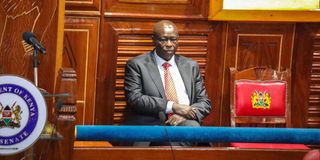Premium
Hearing of Rigathi Gachagua ouster cases resumes

Former Deputy President Rigathi Gachagua during his impeachment hearing at the Senate, Parliament Buildings Nairobi on Wednesday, October 16, 2024.
The hearing of several petitions challenging the impeachment and eventual removal of Rigathi Gachagua as deputy president resumes today.
The cases were adjourned last December to allow Mr Gachagua to pursue an appeal challenging the powers of Deputy Chief Justice Philomena Mwilu to appoint a three-judge bench to determine the petitions.
The matter at the Court of Appeal is yet to be determined.
More than 40 cases were filed challenging Mr Gachagua’s ouster and they were consolidated. The cases are being heard by the Principal Judge of the High Court Eric Ogola, and Justices Antony Mrima and Freda Mugambi.
Mr Gachagua challenged the impeachment, arguing that the allegations against him were founded on falsehoods and outright lies.
The former deputy president said the motion to impeach him was founded on deceit, misrepresentations and suppression of material facts, which had been peddled to the public so as to achieve the improper and unconstitutional purpose.
It is also his argument that the one-day public participation process, which was initiated by Parliament, was not enough “to overturn the sovereign will of the people” who voted for him and President William Ruto in the last general election.
Mr Gachagua described the process as a “choreographed political lynching designed to defeat the sovereign will of the Kenyan people” and prematurely end, for all time, his long and productive career as a public servant.
“That in view of the above reasons when examined against the extremely serious consequences which may befall the petitioner arising from the impugned impeachment, it would be patently unjust and undesirable at this stage, for the respondents to carry on with the exercise of impeaching the petitioner whose net effect is to overturn the sovereign will of the electorate who elected him to office,” Mr Gachagua said in the petition.
The National Assembly voted on October 8, 2024, to kick out Mr Gachagua, but the former DP argues that the MPs did not conduct a constitutionally compliant public participation exercise prior to passing the impeachment motion.
Mr Gachagua was eventually removed from office on October 17 and President Ruto nominated Prof Kithure Kindiki as the deputy president the following day and his nomination was approved by the National Assembly.
This was after the three judges lifted a conservatory order that had been issued by a judge in Kerugoya, stating that the constitutional framework does not envision a scenario in which the office of the deputy president would remain vacant except during the brief period required to fill a vacancy.
Through Senior Counsel Paul Muite, Mr Gachagua argues that the impeachment motion did not meet the threshold test set by Article 145(1) of the supreme law.
He further says the appropriate standard of proof was not considered or met when the National Assembly passed the impeachment resolution.
A total of 281 MPs voted to adopt the 11 charges brought against Mr Gachagua.
But Mr Gachagua submitted that the MPs debated and voted on the motion on grounds other than those set out in the motion.
He further said the impeachment was converted into a vicarious assault on family rather than an investigation of constitutional violations by a public servant.
“The National Assembly and the Senate conducted themselves in an unconstitutional manner and denied the applicant the right to a fair hearing. His rights under Article 50(1) of the constitution were breached,” he submitted.
Mr Gachagua wants the court to consider several issues, including whether a motion for the removal of the deputy president through impeachment can validly be prosecuted in the Senate without public participation.
He further wants the court to determine whether Parliament should have considered new and ‘extraneous matters’ that were not raised in the special motion tabled before the National Assembly.
“What is the standard and mode of public participation that ought to be attained to support an impeachment motion against a democratically elected Deputy President, in the face of a motion that relies on fabricated evidence of public participation?” he posed.





